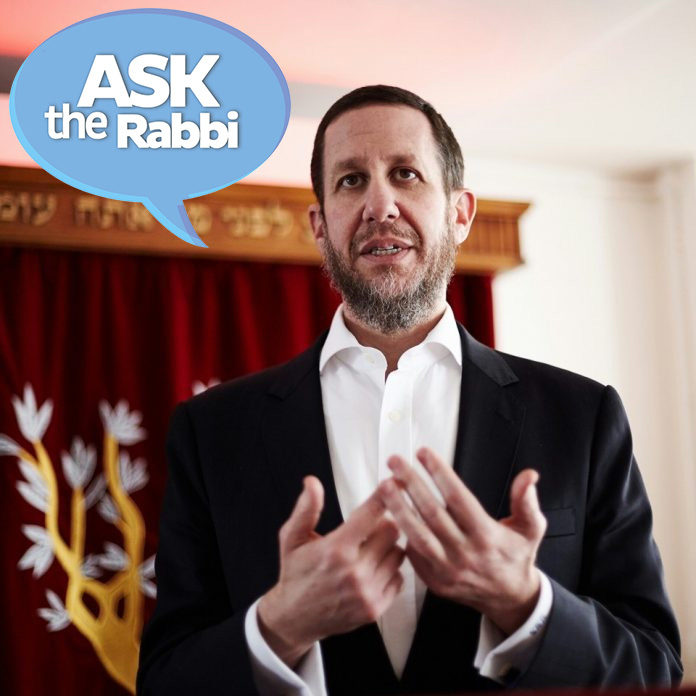
Can My Rabbi Change His Tune?
Dear Rabbi
I attend my synagogue each week and all the Rabbi ever talks about is either Israel or national politics. He’s a great speaker and makes some valid points that I agree with and other points that I passionately disagree with. Do I need to go to Synagogue to hear that every week when all I am really looking for is a little inspiration?
Edwardo
Dear Edwardo
The question is, are more people coming to Synagogue as a result, or are others sharing your sentiment, and more and more dropping out? I, for example, think to myself: Do people want to hear about Anti-Semitism? It’s a headline virtually every week if not every day now. The daily dose of negativity makes them feel miserable enough. Do I really need to add fuel to that scare-mongering fire?
Israel? Also a no-no. We know the politics, we know the diverse views, and we know that regardless of what position you take you’re going to estrange some part of the congregation or another.
The bottom line is I know that the more opinions I have the more I am going to alienate people.
So, while these things might come up every now and then, when deemed necessary, I like to focus on other general themes that inspires people and more than anything makes them think. When I hear feedback about people discussing or debating my speech over a Shabbat lunch then mission accomplished.
That said, I refer you to my question above. If more people are sharing your sentiment and are not coming back – or perhaps walking out before the sermon – then someone ought to say something to the Rabbi sooner, rather than later. If it enraptures and fills the pews, then so be it. After all, it’s ultimately not why they come, but that they come, that matters most.
Finally, I am reminded of the new Rabbi who approached his synagogue president just before Yom Kippur: “I was thinking to talk about Kosher,” he says. “Oh no, don’t do that,” the president insisted. “Most of this congregation have takeaway from McDonalds on a weekly basis.” “OK, then I’ll speak about Shabbat” “Rabbi, have you seen the carpark across the street?” “Oh, right. So perhaps I shall speak about Torah study?” “Rabbi, they have Bridge clubs, poker nights, whisky Wednesdays, and don’t forget football. Forget that idea.” The Rabbi is perplexed. “So what do you think I should speak about then?” The President looks to him puzzled: “Why speak about Judaism of course!”
The Significance of a Hundred
Dear Rabbi
My Grandpa is turning a hundred kenehora, and I need to make a speech. Can you explain the religious significance of a hundred?
Scott
Dear Scott
First, let me deal with my bugbear. There is no word as kenehora. There is a concept of ayin hora – literally “evil eye” which implies the idea of “jinxing” something (without getting into much detail on that now). To negate that, people might say kain which is Yiddish for “no” or “without.” Hence the term emerged, kain-aiyin-horah or when said quickly, kain ainehora. But not kenehora, which sounds more like an Indian folk dance.
As to the number 100! The Rabbis in the Mishna tell us, when one reaches a hundred it is as though “they have ended their cycle and passed from this world.” Now, inasmuch as that sounds like, “it’s game over,” Kabbalah explains this differently. The number ten represents the ten attributes of man – three associated with intellectual faculties and seven associated with emotion. Each of these ten attributes contains something of the other ten within them. So, for example, we are told that Abraham personified kindness (Chesed) and Isaac personified strict discipline (Gevurah). But each of their unique traits were somewhat mitigated by another attribute. So Abraham was kindness, but it was a disciplined kindness (or Gevurah of Chesed). And while Isaac was strict discipline it was softened with kindness (Chesed of Gevurah). So 100 is 10 times 10 or a complete cycle of all the attributes, even as they contain the other attributes within. When one hits a hundred therefore, they have finished this cycle which takes them onto bigger and better things. They have ended in this world means they now transcend this world onto a higher spiritual plateau.
This paper just finished 100 editions, and I am proud to have been associated with it since its inception. From today it moves onto even bigger and better things, and I am sure all readers join me in wishing its editor and all its staff to go from strength to strength.
Is Organ Donation Allowed?
Dear Rabbi
I am a Muslim with a close Jewish friend. We were recently discussing organ donation and I was wondering if you could provide guidance on the Jewish perspective.
Nasar
Dear Nasar
Over half the organ donors in the UK now make their donation in life. Some amazingly altruistic individuals give one of their kidneys to save the life of someone they love. This is completely acceptable in Jewish law; indeed, it is the kind of generosity and care for another human being that is highly laudable in our tradition. The risks are very small indeed; there are now at least two large studies stretching over 40 years which show that giving up one kidney appears to have no negative impact on your life expectancy.
Another area that is repeatedly raised as a potential sticking point in Jewish law, is the desirability of the body being buried intact. It is clear that the opportunity to save someone’s life (pikuach nefesh) supersedes this. And with recent changes in the law and medical practice, potential problems for the Jewish community have been circumvented. The appalling events in Alder Hay Hospital in Liverpool when parts of children’s bodies were stored for years for future research have totally altered the way these things are now handled in the UK. At the time of organ donation, a clear distinction is drawn between consent for donation for organ transplantation for the immediate sake of another, but withhold it for use in research, thus satisfying Jewish requirement.
To be sure, there are still areas of difference between current medical practice and what is acceptable in Jewish law. The most important, is the acceptability of defining death such as the death of the brain stem – there is no consensus amongst rabbinic authorities on this. But overall there is now more clarity than before on the broader acceptability of organ donation.









